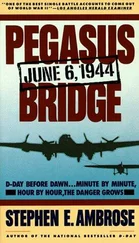Stephen Ambrose - Band of Brothers
Здесь есть возможность читать онлайн «Stephen Ambrose - Band of Brothers» весь текст электронной книги совершенно бесплатно (целиком полную версию без сокращений). В некоторых случаях можно слушать аудио, скачать через торрент в формате fb2 и присутствует краткое содержание. Жанр: История, на английском языке. Описание произведения, (предисловие) а так же отзывы посетителей доступны на портале библиотеки ЛибКат.
- Название:Band of Brothers
- Автор:
- Жанр:
- Год:неизвестен
- ISBN:нет данных
- Рейтинг книги:4 / 5. Голосов: 1
-
Избранное:Добавить в избранное
- Отзывы:
-
Ваша оценка:
- 80
- 1
- 2
- 3
- 4
- 5
Band of Brothers: краткое содержание, описание и аннотация
Предлагаем к чтению аннотацию, описание, краткое содержание или предисловие (зависит от того, что написал сам автор книги «Band of Brothers»). Если вы не нашли необходимую информацию о книге — напишите в комментариях, мы постараемся отыскать её.
Band of Brothers — читать онлайн бесплатно полную книгу (весь текст) целиком
Ниже представлен текст книги, разбитый по страницам. Система сохранения места последней прочитанной страницы, позволяет с удобством читать онлайн бесплатно книгу «Band of Brothers», без необходимости каждый раз заново искать на чём Вы остановились. Поставьте закладку, и сможете в любой момент перейти на страницу, на которой закончили чтение.
Интервал:
Закладка:
It was immediately obvious that Bragg was a staging area, as the division prepared to ship overseas. The food was better; there were beds in barracks with hot showers and other improvements. But the real giveaway was a total reoutfitting. The men got new clothes, new weapons, new gear. They spent their days on the firing range, sighting in the rifles and machine-guns.
Where were they going, east or west, the European, Mediterranean, or the Pacific theater? No one knew, rumors flew from platoon to platoon, bets were made.
On weekends, the men went into Fayetteville to "prime the Pump," at the Town Pump, one of the local bars. Brawls were frequent. Most were started by the paratroopers, who would pitch into the regular soldiers stationed at Bragg. They also goaded the glider troops who were part of the 101st.
The glider troops were regular soldiers assigned to the glider regiment. Although they were airborne, they were not volunteers and were treated by the Army as second-class men. They did not receive the $50 per month bonus, they had no special badges, they did not wear boots and bloused trousers. Some of them made up posters showing photographs of crashed and burned gliders, with a caption that read: "Join the glider troops! No flight pay. No jump pay. But never a dull moment!"
A few members of Easy went down to the airfield at Bragg to take a ride on a glider. The experience of landing in one of those plywood crates convinced them jumping with a chute was a better way to land. When General Lee made a glider flight, the landing fractured several of his ribs. "Next time I'll take a parachute," he remarked. "We told you so!" the glider troops shouted. (In July 1944, the glidermen finally got the hazardous duty bonus of $50 per month and a special insignia.)
In mid-August, the division assembled in regimental formation. A band played "Over There" and the Red Cross girls cried as the men marched to the twenty trains waiting to take them off to war. Once aboard and somewhat settled down, the betting began over which way the trains would head, north toward New York and then Europe or the Mediterranean, or west toward California and then the Pacific.
The trains headed north, toward Camp Shanks, 30 miles up the Hudson River from New York City. Promises were made about passes into the city, promises that were not kept. Instead it was more inspections, followed by inoculations. "Shot followed shot," Christenson remembered, "until our arms hung from our bodies like limp ropes." Officers and noncoms got to know the Preparation for Overseas Movement manual by heart.
Sobel wrote up a form letter to send to the mothers of his troopers. "Dear Madam," it began. "Soon your son, Pfc. Paul C. Rogers [each name was typed in] will drop from the sky to engage and defeat the enemy. He will have the best of weapons, and equipment, and have had months of hard, and strenuous training to prepare him for success on the battlefield.
"Your frequent letters of love, and encouragement will arm him with a fighting heart. With that, he cannot fail, but will win glory for himself, make you proud of him, and his country ever grateful for his service in its hour of need." He signed each letter with a flourish, "Herbert M. Sobel, Capt., Commanding."
The enlisted men got hold of some whiskey. They were accustomed to beer, so the whiskey hit them hard. Christenson got so drunk he was "making out with the toilet," a condition common to young men who have just been introduced to whiskey. Corporal Randleman found him and gently carried him to bed. The next morning, the air filled with the moans and groans of the hungover men, the company marched down to the docks. A ferry carried the men to a pier, where hot coffee and doughnuts from the Red Cross girls helped revive the near-dead.
There was a great deal of cursing, partly because the men had hoped to march through New York City on their way to war and did not, also because they were not allowed to wear their jump boots. The reason: enemy spies might see them and would know that an airborne division was shipping out. They had to take the patch of the 101st, the Screaming Eagle, off their shoulders.
Winters remembered only one case of Gangplank Fever. A medical officer was "just smart enough to know what to take to be assigned to sick call and miss the voyage." All the others lined up in single file to walk up the gangplank, lugging their barracks bags and weapons. As they stepped onto the liner converted into a troop transport and called out their names, a checker marked them present. It took almost a full day to get the 5,000 men aboard a transport built to carry 1,000 passengers. Finally tugs towed the ship from her berth, and she started steaming out to sea. The men of Easy Company lined the rails to see the Statue of Liberty slip astern. For nearly every one of them, it was his first trip outside the United States. A certain homesickness set in, coupled with a realization, as the regimental scrapbook Currahee put it, of "how wonderful the last year had been."
3 "DUTIES OF THE LATRINE ORDERLY"
*
ALDBOURNE
September 1943-March 1944
The Samaria was an old India mail liner and passenger ship converted to a troop transport. Originally built for 1,000 passengers, she carried 5,000 men from the 506th. The overcrowding created really dreadful conditions. Fresh water was severely rationed; the men could drink only at stipulated fifteen-minute intervals for a grand total of an hour and a half a day. The showers ran salt water, cold. The men had to wear their life jackets at all times, and their cartridge belts with canteens attached, which meant they were constantly bumping into one another. They slept in their clothes. One bunk was assigned to two men, which meant they alternated, sleeping every other night on the deck or in a hallway or wherever space to lie down could be found. The stench was simply awful.
There were two meals a day. Christenson described his first breakfast: "I didn't think we would ever stop going down stairs to the mess hall on the lowest deck, stairs that were slippery with grease and when we finally reached the bottom, the stench was almost overpowering. They fed us from large pots, containing boiled fish and tomatoes. The cooks wore stained white clothing, stains on stains showing they hadn't changed for days." The men ate the slop because they were hungry; to Webster, the mess hall had "the air of a floating madhouse."
At least the meals were a break from the routine, which consisted of walking the decks, leaning on the rail watching the convoy, or gambling. The gambling was continuous: poker, blackjack, and craps. Large amounts of money changed hands. Carson won $125 one night, lost it all the next day. Men tried to read, but they had precious few books. Captain Sobel tried to lead the men in calisthenics, but the space was insufficient and it became another Sobel joke.
On September 15, the Samaria docked in Liverpool. The next day a train took the men south. Trucks picked them up at the station at Ogbourne St. George and carried them on to their new home. They marched the last mile and a half, after dark, with only flashlights to show the way,- the wartime blackout impressed upon the men that they were in a combat zone. They got to their barracks, which were Nissen huts heated by twin potbellied stoves, were given mattress covers and shown the straw they could stuff into them, along with heavy wool blankets that itched, and went to bed.
Webster wrote that when he woke the next morning, "I thought I'd passed out on a Hollywood movie set. All around the area were fairybook cottages with thatched roofs and rose vines on their sides. Vast horses shaking long manes stomped down narrow winding cobblestone lanes. A soft village green set off a weathered old grey eleventh century Norman church whose clock chimed the hours just like Big Ben, and five ancient public houses, their signboards swinging in the breeze, bade us welcome to the land of mild and bitter beer." They were in Aldbourne, in Wiltshire, near Hungerford, not far from Swindon, 80 miles due west of London. It would be home for Company E for almost nine months, by far the longest period it stayed in one place.
Читать дальшеИнтервал:
Закладка:
Похожие книги на «Band of Brothers»
Представляем Вашему вниманию похожие книги на «Band of Brothers» списком для выбора. Мы отобрали схожую по названию и смыслу литературу в надежде предоставить читателям больше вариантов отыскать новые, интересные, ещё непрочитанные произведения.
Обсуждение, отзывы о книге «Band of Brothers» и просто собственные мнения читателей. Оставьте ваши комментарии, напишите, что Вы думаете о произведении, его смысле или главных героях. Укажите что конкретно понравилось, а что нет, и почему Вы так считаете.



![Stephen Ambrose - Citizen Soldiers [Condensed]](/books/346737/stephen-ambrose-citizen-soldiers-condensed-thumb.webp)
![Stephan Orth - Behind Putin's Curtain - Friendships and Misadventures Inside Russia [aka Couchsurfing in Russia]](/books/415210/stephan-orth-behind-putin-s-curtain-friendships-a-thumb.webp)





